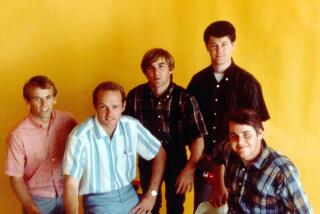At last, a ‘Smile’ for the ages
- Share via
Years before “ambition” became a synonym for pretension in pop music, Beach Boys leader Brian Wilson was bent on expanding the genre’s parameters with “Smile,” a wide-ranging musical, social and cultural exploration rooted in the mythology of the American West.
The high concept, along with Wilson’s sophisticated music and partner Van Dyke Parks’ abstract lyrics -- all light-years beyond the simple “Fun, Fun, Fun” level of the group’s previous hits -- were too much in 1967 for the other Beach Boys and executives at their record company.
Their lack of support prompted Wilson to scrap “Smile” and contributed strongly to his downward spiral over the next two decades. For years, he refused to even talk about “Smile.” Yet the early buzz as it was being recorded, and which grew to legendary proportions in the intervening years, was that it would have rivaled, or perhaps topped, the album the Beatles were working on at the same time -- “Sgt. Pepper’s Lonely Hearts Club Band” -- as rock’s next great leap forward.
Listening to Wilson’s resurrected and newly recorded version of “Smile” (in stores Tuesday), it’s as easy to understand why the other Beach Boys balked at putting it out 37 years ago as it is to lament the Pacific Ocean-sized missed opportunity.
It’s difficult not to imagine that “Sgt. Pepper” wouldn’t have sounded nearly as revolutionary -- conceptually or structurally -- had it appeared months after “Smile” as originally scheduled.
This magnificently complex yet always accessible three-part suite for rock band, orchestra and voices -- Wilson once called it a “teenage symphony to God” -- surely would have dazzled the rock cognoscenti almost four decades ago, just as it probably would have left many fans and radio programmers scratching their heads.
It’s clear, however, that Wilson kept his promise to outdo what the Beach Boys had crafted with the critically lauded “Pet Sounds” in summer 1966 at the height of the group’s friendly artistic rivalry with the Fab Four.
Wilson and Parks, then 24 and 22, respectively, wanted to take a distinctly American look at the emerging ethos of the ‘60s counterculture at a point before the downsides of the era’s anything-goes attitude became so glaringly apparent.
In fact, “Smile” questions the validity of what Neil Young later called “the hippie dream” at several junctures. “Cabin Essence” musically, lyrically and sonically evokes the cultural tornado that swept up Wilson and millions of other youths in the mid-’60s. “Wonderful” is a haunting ballad that charts loss of innocence, and “Surf’s Up” functions as a bittersweet epitaph for the generation’s unbridled optimism.
“Smile” opens with the wordless a cappella number “Our Prayer,” reflecting Wilson’s lifelong fascination with the harmonic interplay of densely layered voices. That segues into an ancient-sounding tidbit of street-corner vocalizing on the Crows’ 1950s R&B; gem “Gee” before shifting into “Heroes and Villains,” one of “Smile’s” cornerstone numbers and one of Wilson’s most elegantly structured songs -- his way of telling pop fans, “You’ll never hear doo-wop music again.”
Parks’ poetic, often nonliteral lyrics in some ways echoed Bob Dylan but also grew out of his own formal education and gave Wilson a sophisticated and versatile framework on which to build his musical evocation of the dawning psychedelic era.
As in a classical symphony, bits and pieces of “Heroes and Villains” surface repeatedly in surprising ways, just as snippets of the album-closing “Good Vibrations” are foreshadowed in songs that precede it.
It now seems a no-brainer that the love-espousing Wilson would conclude “Smile” with the upbeat life philosophy of “Good Vibrations.” When an abbreviated reprise of “Our Prayer” links with the familiar opening of “Vibrations,” Wilson delivers one of the most effervescent musical moments imaginable.
Long considered an aborted masterpiece, “Smile” has been debated extensively by fans and musicologists over the years. The chunks that surfaced on scattered Beach Boys albums or in bootleg form merely fueled the debate on what it would have sounded like had Wilson not thrown in the towel.
In this version, performed by Wilson and the band that’s been backing him since his return to the concert stage about five years ago, “Smile” emerges as a beautiful and cohesive work, at times deeply moving, at others oddly whimsical, at still others eerily disturbing but celebratory.
Wilson, who handles all the lead vocals, sounds more assured on record than he has since the 1970s. Some purists may pine for the voices of the late Carl Wilson and the estranged Mike Love, who played key roles in the original recordings, but the real genius of “Smile” isn’t who sang what but its ingeniousness as a composition.
That said, the character, respect and enthusiasm invested by the musicians who now surround Brian Wilson leave virtually nothing to be desired.
Even though it has arrived almost 40 years late, neither does “Smile.”
*
Brian Wilson will perform “Smile” and other works Nov. 2 and 3 at Walt Disney Concert Hall, 111 S. Grand Ave., Los Angeles. 8 p.m. $65 to $135. (323) 850-2000.
More to Read
The biggest entertainment stories
Get our big stories about Hollywood, film, television, music, arts, culture and more right in your inbox as soon as they publish.
You may occasionally receive promotional content from the Los Angeles Times.








